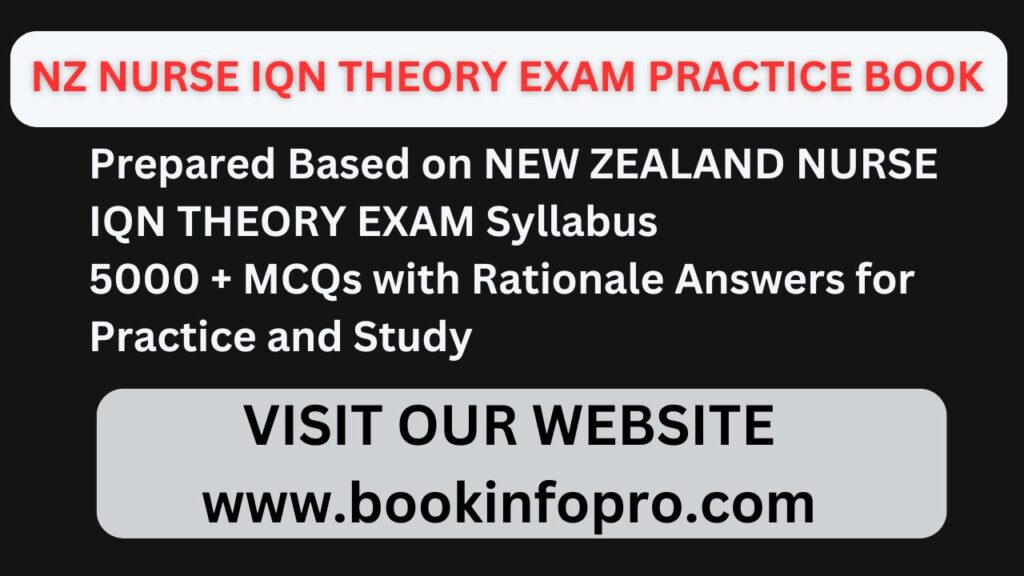NEW ZEALAND IQN EXAM QUESTION – LONG TERM CONDITION MANAGEMENT
Theoretical Exam Preparation: This video helps to prepare and improve your confidence with solved question papers, IQN related MCQs. Examination structure The examination questions are designed to assess knowledge which is required to practise safely as a nurse in Aotearoa New Zealand. The scope of the questions in each part of the examination are:
Part A: Medication Safety – medication and fluid safety questions including medicine calculations.
Part B: Nursing Knowledge – questions are closely linked to the Council’s registered nurse competency domains: • professional responsibility – questions include but are not limited to: ethical/legal safety, culturally safe care, delegation/supervision, and safe and effective environments and practice. • management of nursing care – questions include but are not limited to: assessment, prioritising, decision making, planning, delivery and evaluation of nursing care, infection prevention and control, medication/fluid safety, vaccination/immunisation, long term condition management, deteriorating patient, consumer rights and advocacy, patient and whānau/family education, and health promotion. Interpersonal relationships and interprofessional healthcare – questions include but are not limited to: therapeutic relationships/partnership, health team relationships, and records management/information exchange.
1. What is the primary goal of long-term condition management?
A. Cure the condition
B. Maintain and improve quality of life
C. Reduce healthcare costs
D. Eliminate symptoms
Answer: B. Maintain and improve quality of life
Explanation: Long-term condition management focuses on helping patients live as well as possible despite their chronic condition, which involves managing symptoms and improving overall quality of life.
2. Which of the following is a common long-term condition?
A. Acute bronchitis
B. Diabetes
C. Influenza
D. Appendicitis
Answer: B. Diabetes
Explanation: Diabetes is a chronic condition that requires ongoing management, unlike acute conditions like bronchitis or appendicitis.
3. Which lifestyle change is most important for managing hypertension?
A. Increasing calorie intake
B. Decreasing physical activity
C. Reducing sodium intake
D. Increasing sugar intake
Answer: C. Reducing sodium intake
Explanation: Reducing sodium intake helps manage blood pressure levels, which is crucial for managing hypertension.
4. Which of the following is a key component of self-management for patients with long-term conditions?
A. Self-diagnosis
B. Ignoring symptoms
C. Adherence to treatment plans
D. Avoiding all medications
Answer: C. Adherence to treatment plans
Explanation: Adhering to prescribed treatment plans is essential for effectively managing long-term conditions and preventing complications.
5. What role does patient education play in managing long-term conditions?
A. It has no role
B. It confuses patients
C. It empowers patients
D. It replaces medical treatment
Answer: C. It empowers patients
Explanation: Educating patients about their condition and management strategies empowers them to take an active role in their care.
NEW ZEALAND IQN NURSE THEORY EXAM PRACTICE BOOK
6. Which of the following is a common symptom of chronic obstructive pulmonary disease (COPD)?
A. Sudden chest pain
B. Persistent cough
C. Acute abdominal pain
D. Intermittent fever
Answer: B. Persistent cough
Explanation: Persistent cough is a hallmark symptom of COPD, along with shortness of breath and wheezing.
7. Which intervention is crucial for managing chronic heart failure?
A. High-fat diet
B. Fluid restriction
C. Increasing sodium intake
D. Avoiding all medications
Answer: B. Fluid restriction
Explanation: Fluid restriction helps prevent fluid overload, which is crucial in managing chronic heart failure.
8. What is the primary benefit of exercise for patients with long-term conditions?
A. Cure the condition
B. Improve overall well-being
C. Increase healthcare visits
D. Avoid medication
Answer: B. Improve overall well-being
Explanation: Regular exercise improves physical and mental health, enhancing the overall well-being of patients with chronic conditions.
9. Which healthcare professional is typically involved in the management of long-term conditions?
A. Surgeon
B. Radiologist
C. Primary care physician
D. Pathologist
Answer: C. Primary care physician
Explanation: Primary care physicians often coordinate the overall care for patients with long-term conditions.
10. What is the significance of monitoring blood glucose levels in diabetes management?
A. It is unnecessary
B. Prevents diabetes
C. Helps adjust treatment
D. Increases sugar levels
Answer: C. Helps adjust treatment
Explanation: Monitoring blood glucose levels allows for timely adjustments in treatment to maintain optimal blood sugar control.
11. Which dietary change is recommended for patients with chronic kidney disease (CKD)?
A. High-protein diet
B. Low-phosphorus diet
C. High-potassium diet
D. Increased sodium intake
Answer: B. Low-phosphorus diet
Explanation: A low-phosphorus diet helps prevent complications such as bone and cardiovascular issues in CKD patients.
SEO SEARCH
#medicationmcq #practicenursemcq #culturallysafecarenursing #decisionmaking #nursingdecisionmaking #nursingassessment #assessment #medicationsafetymcq #medicationsafety #iqn #drugdosagefornurses #drugdosagecalculations #drugdosage #newzealandurses #nursingknowledge #nursingknowledgemcq #drugcalculationmcq #drugcalculation #medicinecalculationmcq #drugcalculationfornurses #solvedquestionpaper #NursingPracticeQuestions #StaffNurseExam2024 #nurseinfocanestar #SolvedQuestionPaper #StaffNurseMCQ #PharmacologyMCQ #CriticalCareNursingMCQ #PediatricNursingMCQ #ObstetricNursingMCQ #PsychiatricNursingMCQ #GerontologicalNursingMCQ #MentalHealthNursingMCQ #nursingresponsibility #fluidsafetymcq #nursingresponsibilitymcq #nursingmanagement #medicationsafetymcq #nursingmanagementmcq #nursingcare #nursingcaremcq #ethicalandlegalnursingmcq #nzethicalandlegalnursingmcq #delegationnursingmcq #supervisonnursingmcq #longtermconditionmanagementmcq #longterm #longtermhealth #longtermdisease #mcqs #newzealandurses #newzealand #nursingplanning #nursingcareplan #nurseplan #nursingcareplanningmcq #patienteducation #whanau #whānau #patientfamilyeducation #vaccination #immunization #vaccinationmcq #immunizationmcq #nursingrecords #nursingreport #record #recordmanagement #recordmanagementmcq #therapeutic #therapeuticrelationship #therapeuticcommunication #therapeuticmcq #therapeuticquiz #healthpromotion #healthpromotionmcq #healthpromotionquiz #nursinghealthpromotion #information #informationexchange #informationexchangemcq #nursinginformationexchangemcq #mcqs #newzealandmcqs #previousyearquestions #samplequestionpaper #sample #newzealandpreviousyearquestionpaper #iqnmocktest #nziqnmocktest #newzealandiqnmocktest

